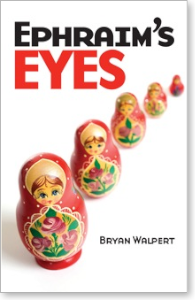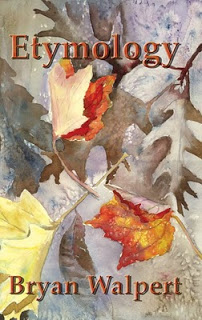 Bryan Walpert is the author of a book of poetry, Etymology (Cinnamon Press), and a book of short stories, Ephraim’s Eyes (Pewter Rose Press), both published in 2009. His poetry, fiction, and/or essays have been published in New Zealand, Australia, the UK, Canada and widely in his native United States. His poems have won a number of awards, including most recently both first and third-equal prizes in the 2007 NZ Poetry Society International Poetry Competition and the James Wright Poetry Award through the Mid-American Review (U.S.) the same year. He won the 2007 Royal Society of New Zealand Manhire Prize in Creative Science Writing for his short story “16 Planets,” a story included in Ephraim’s Eyes.
Bryan Walpert is the author of a book of poetry, Etymology (Cinnamon Press), and a book of short stories, Ephraim’s Eyes (Pewter Rose Press), both published in 2009. His poetry, fiction, and/or essays have been published in New Zealand, Australia, the UK, Canada and widely in his native United States. His poems have won a number of awards, including most recently both first and third-equal prizes in the 2007 NZ Poetry Society International Poetry Competition and the James Wright Poetry Award through the Mid-American Review (U.S.) the same year. He won the 2007 Royal Society of New Zealand Manhire Prize in Creative Science Writing for his short story “16 Planets,” a story included in Ephraim’s Eyes.
A former journalist, he holds an MFA from the University of Maryland-College Park and a PhD in English from the University of Denver. Bryan is a senior lecturer in the School of English & Media Studies of Massey University, where he teaches creative writing. He is the recipient of a national Tertiary Teaching Excellence Award from the New Zealand Qualifications Authority.
Etymology and Ephraim’s Eyes are both available through Fishpond, the Nile Bookstore, Amazon.com, the Book Depository, and directly through the publishers: http://www.cinnamonpress.com/titles-poetry.htm and http://www.pewter-rose-press.com/books/ephraims/ephraims.html. They are available as well at Bruce McKenzie’s bookstore in Palmerston North.
Bryan, you are known both for your fiction and your poetry. In your writing practice (if that’s not too pretentious a term), do you slip frequently between one and the other, or do you focus for long periods on one genre, then switch to the other?
I tend to focus on one or the other. I’m usually writing the genre I’m reading. But that includes non-fiction as well. When I’m writing poetry, I can’t imagine why anyone would write anything else. Or for that matter do anything else. When I’m writing fiction, I feel the same about fiction. Perhaps this makes me disloyal. Or fickle. But I think it just goes to show how seductive different kinds of languages can be.
Your short story collection Ephraim’s Eyes contains a mixture of science fiction and literary fiction stories. My own experience is that some reviewers and readers find such a mixture disconcerting, while it appeals greatly to others. How have readers and reviewers reacted to the mixture of stories in Ephraim’s Eyes?

Are you thinking specifically of “Speculative Geography”? I don’t see it as a science fiction story, per se, though. I see that story as simply referring to, or making use of, the SF genre. “Speculative Geography” is about a writer of science fiction, rather than strictly about a science fictional world, though it describes that world. I like playing with genres of all kinds, hence for example “Speckled Hen,” which is meant to read a bit like a philosophy essay, and “Word Problems,” which plays with math. I’ve only received a few reviews so far, but no one has had a problem with those elements (as far as I know!).
I’ve read a couple of reviews of your poetry collection Etymology which suggest that there is a tension in the book between science and humanism. Do you think there is any truth to this?
The tension I see reflected by readers is between emotion and intellect. That is, the idea is that that poetry should be purely the heart—expression—while science engages the head. My own take is that this is a dated and counter-productive view of poetry (and science for that matter). I think poetry is very much an intellectual (or can be an intellectual) engagement with the world (and word). But at the same time, I hope even the science-oriented poems in the collection appeal to the heart. I think for me, as a writer, the way to the heart is often through the head.
Etymology does what it says on the cover: there is, indeed, a strong focus on etymology in the book. Why did you choose to make this a central focus of the collection?
It chose me, I think. It goes back, really, many years. My wife found an etymological dictionary in a used bookstore and handed it to me, knowing my interest in language. Reading the entries—and following one to another—led to some of these poems, including the title poem. That title poem was initially called “Shit.” The editor of a journal that accepted the poem suggested changing the title to “Etymology.” That led to the title of the book, which shows how important editors are and how collaborative writing is, in the end. The collection gradually took shape, much as a poem does, as one thing echoed another.

What benefits, or disadvantages, have you found in moving from the US to the New Zealand literary environment?
One great benefit has been how much easier it is to get to know other writers; the circle is smaller and the distances shorter, so I’ve met many writers here whose work I enjoy. Another benefit is the general interest in poetry and literary fiction in New Zealand—it seems to play a large role in the culture here, seems an important part of national identity.
One disadvantage is the difficulty keeping up with new American writing, poetry in particular. Books come out all the time, and I don’t get to run across them on the shelf very often. When I get back to the States for visits, I always hungrily browse the shelves at the bookstores. And I don’t get to see my writing colleagues in the U.S. very often. I feel increasingly part of two worlds, which is both interesting and challenging.
It is particularly challenging to move to NZ because there is a whole history of literature here—tied in of course with the cultural history—to catch up on. I was asked by a U.S. poetics journal, Reconfigurations, to solicit some NZ poems for an issue and to write a foreword for the group. I was very conscious as I did so of being an immigrant. If anyone’s interested, you can find the NZ feature at http://reconfigurations.blogspot.com/2009/11/new-zealand-poetry-poetics.html. You’ll need to scroll down for the NZ section.
I had a great time when I visited Palmerston North last year for a poetry reading. Is it important to you to be, or feel, part of a literary scene, or could you work just as happily in splendid isolation?
Palmerston North has a lively writing scene, doesn’t it? I think periods of isolation are useful. But from the beginning I’ve always written in a community—that’s part of what graduate poetry workshops offer, for example. And I do like being part of a larger literary environment.
I help to coordinate a literary reading series Massey co-sponsors with the Palmerston North City Library, for example—called Writers Read, it is in its 5th year—because that sort of environment is important for writers, students and the community at large. The community has been incredibly supportive of it, with audiences at times of 200. It helps that we’ve had such wonderful writers in that series. Listening to writers read their work can often change my relationship with their poems and stories; and it can often be inspiring.
I’m also part of an informal writers group here; it’s very useful to get feedback on work. In other words, I do believe that writing in isolation is splendid, but again I do believe that writing in the end is collaborative.
How does being a teacher of creative writing affect your own writing?
That’s a good question. It’s a bit difficult to pin down, though surely it has an effect. It has sharpened my thinking about writing: What is a poem? What makes it work? What is a story? What should it accomplish? To what extent are my own poems arising from or working against tradition? Beyond that, it’s hard to say.
Which writers of fiction and poetry have been most influential on your own work, and which writers do you most enjoy reading?
There have been so many writers who have been influential. But if I were to choose several that, at various stages, have been particularly important to my writing or to my thinking about writing, they would be Philip Levine, Donald Revell, Alan Shapiro, Alice Fulton, Joan Retallack, and David Foster Wallace.
What writing projects do you have on the go at the moment, and where are we next likely to see you in print?
I’m focusing intently now on completing a scholarly book on the intersections of poetry and science, so that’s pushed poetry and fiction to the margins for a few months. But I have a second book of poetry completed and submitted to publishers, largely in the U.S. I have a third collection of poetry well underway that is oriented towards New Zealand. And I’m working on a collection of creative non-fiction essays that have to do with poetry and, often, with moving to New Zealand. Watch this space.
Etymology
Shit: A sibling to schism, its root means
separation, and perhaps we are
severing an unwanted self, hiding
or drowning it or at least distancing
ourselves from mistake or memory.
My grandfather, years before
we released him to the ground,
paid someone to hold him
over the toilet, to pull him to his feet.
The door ajar, I saw him lean
naked on his nurse, who later folded him
against the pillows in his kitchen chair,
emptied. And what to do but fill that void
with his wife’s bread or familiar touch,
a word that once meant a bell striking,
as if a caress rang a pitch that might
connect us to what we were before we split
the infinite with language—me, wife, earth—
words to name and know ourselves as parts.
When we part, we say farewell
(fare a word for food) or good-bye,
which once meant God be with you.



